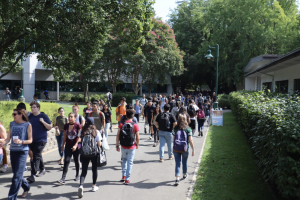Academic advising issues and miscommunication worry Sac State students
Class listed as writing intensive no longer meets requirement
Sacramento State students face issues with their academic advising, including issues with a class listed as a writing intensive on the social sciences’ website that no longer meets the requirement. Graphic made in Canva.
December 9, 2020
Sacramento State student Joshua Feldman has dealt with two requirement issues during his last semester at Sac State because of advising that led him to believe he had completed all of his graduation requirements.
The first advising issue that social science major Feldman had was his writing intensive requirement. Feldman said his advisor, ethnic studies professor Timothy Fong, informed Feldman in a mid-October email that the writing intensive course he was taking no longer met the requirement.
Feldman said Fong advised him to take History 138A to meet the requirement during a counseling meeting in the spring 2020 semester. Feldman said that Fong would pull out the same requirement form he’s been using for Feldman for the last three years, which was outdated.
“In terms of navigating my way through the school system, it’s definitely a challenge,” Feldman said. “My entire college career, I’ve been going off that advising form.”
RELATED: Students clash with professors violating Sac State policy restricting webcam requirements
Feldman said he was worried he would be stuck in school another semester just to complete his writing intensive requirement.
“The whole time I was under the impression I was taking the right class,” Feldman said.
Feldman was able to fulfill the writing intensive requirement after signing a general education substitution petition for his History 138A class to count toward the requirement. Fong said that the class would likely be accepted in substitution because it had previously been considered a writing intensive course, according to an email he sent to Feldman.
“I just take his word for it and go with it because I have no reason not to trust him,” Feldman said in regards to Fong’s advice. “At no point did he take responsibility over his part in it.”
Feldman said Fong only apologized for the confusion and said that the lack of ownership and a direct apology is what upset him the most.
“There should have been an expedited process for this in terms of getting the substitution form accepted,” Feldman said.
The State Hornet reached out to Fong through email and phone call in mid-November but has not received a response.
As of publication, the advising form on the social sciences department’s website still has History 138A listed as meeting the writing intensive requirement.
Sac State’s course catalog has the class listed as only meeting the GE area D requirement for the spring 2021 semester and does not list it as meeting the writing intensive requirement.
“Double check everything,” Feldman said as advice to students dealing with similar situations. “Even if it’s coming from a school website, verify it with another source if possible. The course catalog is the Bible.”
RELATED: Professors unknowingly violate webcam policy, Faculty Senate votes to keep spring break
Feldman’s struggles with advising would not end there. Feldman said Fong had also informed him in the same October email that Sac Statedid not have Feldman’s foreign language requirement fulfilled yet and asked he provide proof of completion from his high school.
Assistant registrar Jocelyn Holdbrook emailed Feldman in November to inform him that his three years of high school foreign language courses, two in Yiddish and one in Hebrew, do not meet the CSU foreign language requirement. Sac State’s foreign language requirement states that students need to have completed a third year of a foreign language in high school to meet the requirement.
Feldman said that he received advising at the academic advising center at Sac State in April 2019, and was told that the high school classes would meet the language requirement. He did not send his transcript to Sac State to get the requirement approved until early November of this year because he said he was under the impression that the classes would count.
“It mentions ‘a third year language’ but does not specify that all three years need to be the same language, nor does it clearly state a level three class must be completed,” Feldman said in an email response to Holdbrook in regard to the foreign language requirement.
Feldman said his Progress to Degree page in Sac State’s Student Center now shows his foreign language requirement as being complete, but has not received an email from the Office of Undergraduate Studies affirming the exemption.
Feldman said Fong assured him via email that his foreign language requirement will now be marked as completed and that his writing intensive requirement will also be marked as completed after passing his History 138A class with a C- or better.
“It sucks not knowing what you can believe from the school anymore,” Feldman said. “It doesn’t give you much faith in the Cal State system.”
Daniel Weiss, 22, an interior architecture major at Sac State graduating next semester, also said he has struggled with advice he received from his few visits to the Academic Advising Center.
“I feel like I have to figure stuff out on my own,” he said. “I’m always writing down all the classes I’m taking and the requirements I need.”
Weiss said advisors usually tell him to take individual classes to fulfill each requirement instead of recommending him to “double-dip” which means taking a class that meets more than one requirement.
Weiss mentioned that he noticed a huge difference when seeing his major advisor instead of the general education advisers at the academic counseling center.
“I think you would find better resources with someone that understood what courses you’re taking,” he said.
RELATED: Sac State chooses to implement a partial no credit grading policy for this semester
Steve Perez, provost and vice president of Academic Affairs, said the Office of Academic Affairs will do its best to fix issues that have been caused by improper advising.
“When I’ve been an advisor, I’ve advised a student that these classes should work for you and then they don’t, and we fix it,” Perez said. “If something’s due to improper advising or a mistake that we’ve made, the last thing we want to do is disadvantage a student for one of our mistakes.”
Vice President of Student Affairs Ed Mills said that somewhere around 2% to 3% of the student body that is graduating will encounter an issue with one requirement but having two or more issues is uncommon.
The mistake Feldman is dealing with is likely due to Sac State advisors misinterpreting high school transcripts because of how different they are from college transcripts, according to Mills.
“High school transcripts are all different,” he said in regards to interpreting high school courses and their translation to CSU courses. “I don’t say that as an excuse, but it’s easier to make a mistake on a high school transcript.”
Mills said that the Division of Student Affairs will do its best to find options for students to resolve these issues but that it is students’ responsibilities to have read through the requirements and understand them.
“I understand most students don’t do that, even though I really want them to,” Mills said. “Knowing that that’s human nature, we will try everything we can think of [to help].”
Mills said any student dealing with similar issues should contact student affairs or email him directly at [email protected].



































































































































